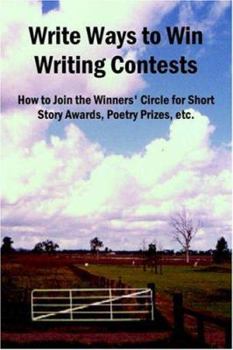Write Ways to Win Writing Contests: How to Join the Winners' Circle for Short Story Awards, Poetry Prizes, Etc.
Select Format
Select Condition 
Book Overview
A book industry insider, who is also a contest judge and an acclaimed author, details sure-fire stratagems to achieve success in creative writing contests and literary competitions. This description may be from another edition of this product.
Format:Paperback
Language:English
ISBN:1411605756
ISBN13:9781411605756
Release Date:March 2004
Publisher:Lulu.com
Length:120 Pages
Weight:0.48 lbs.
Dimensions:0.3" x 6.0" x 9.0"
Customer Reviews
2 ratings
Winning Writing Contests Has Nothing To Do With Chance Or Luck!
Published by Thriftbooks.com User , 17 years ago
As the Chief Judge of three of America's most popular writing contests, I've had plenty of chances over the years to evaluate just how much chance the average entrant has of actually winning that $2,000 First Prize. The answer, to be frank, is very little, because most entrants just send in a poem or a story and then hope the judge will agree that it's the best. If you're really serious about winning and establishing any sort of literary reputation for yourself, there are three essential things you must do: (1) Know your judge; (2) Know your contest; (3) Know your own work. (1) Know your judge. I would avoid contests where the judge is not named before entries close. When the judge is named, I try to find out as much as I can about him or her. What sort of books does he write? What are his hobbies or interests? Does he or she have any particular hang-ups? For example, if she's a stickler for correct grammar, it's a waste of time to send in poems in which the personal pronoun is rendered "i" instead of "I". (2) Know your contest. Read as many of the previous prize-winning entries as you can. If it's a prose contest, what type of story does the judge seem to favor? It's no use sending the greatest baseball story ever written to a judge who wouldn't know Babe Ruth from King Kong. (3) Know your own work. Actually, the reverse is true. Writers can rarely evaluate the worth of their own work. So always send in three or more entries. Time and again I've awarded a prize to a work and the entrant has replied, "I was surprised 'The Cat's Calculus' won First Prize. I thought my other entries, particularly 'Daddy's Dandy Dandelion', had a far greater chance of success!" These are just three pointers from my book, but they are three of the most valuable.
Learn the tricks and unwritten rules about contests
Published by Thriftbooks.com User , 20 years ago
When reading the words "open theme" in a contest, what comes to mind? Anything goes? It's anything but. The book imparts this type of advice along with what topics or themes to avoid and how to approach themed-based contests. The book has over 80 pages of help plus an appendix of four examples of winning entries. John Howard Reid has entered 80 contests in 18 months as research for the book. He also runs a contest (which he mentions a few times), so he has the perspective of the other side, the person accepting and judging the entries. Creating a winning entry takes more than outstanding content. Like applying for a job or college, it also takes research. The author provides details in condensed and easy-to-read chapters saving the writer time in trying to figure out the process. He discusses scams and knowing which ones are legitimate contests and which are rip-offs. Not all scams are limited to the, submit-your-poem and you-won't-have-to-pay-a-dime, but you-might-want-to-buy-the-anthology-for-outrageous-prices-to-show-off-your-published-poem scam. Baird gives tips on how to weed out the bad seeds. His advice comes across as a seasoned expert in the topic and he fearlessly shares his opinions about contests and rules. (...)






